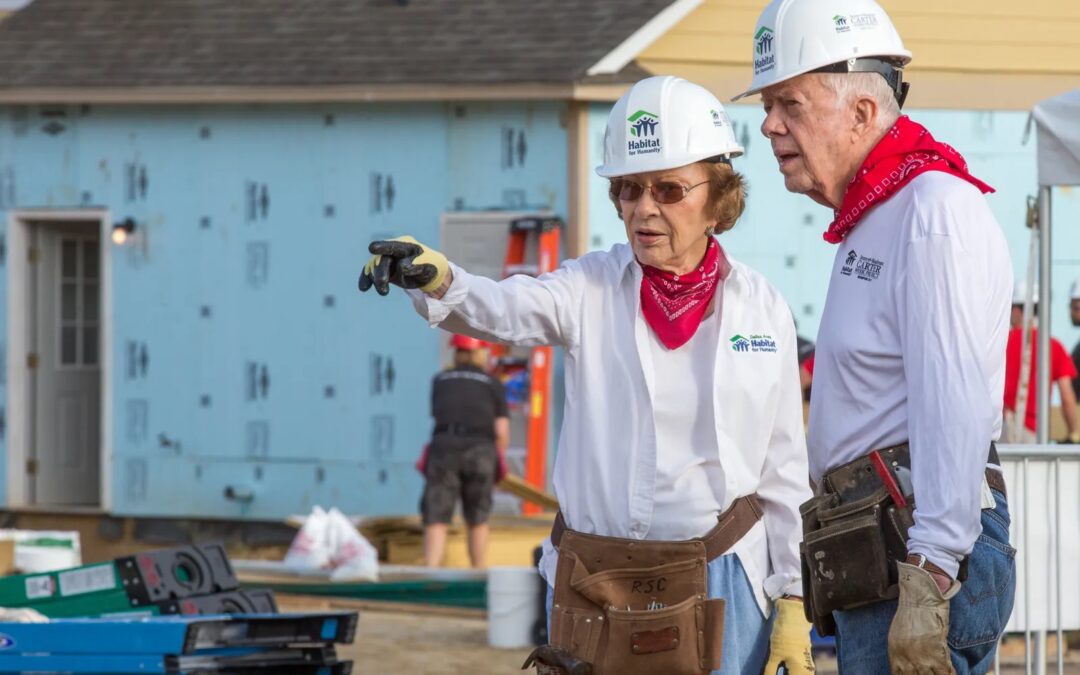Almost all our heroes turn out to be ultimately flawed, but for me, one man who died very recently, undoubtedly disproved that sentiment.
With the passing of Jimmy Carter on 29th December 2024, the United States lost the most authentically Christian president that nation has ever known. To say that is not to say that he was perfect, because who among us is? But it feels to me tremendously sad that today’s evangelical Christians in the USA have so unquestionably attached their allegiance to a man who is in every conceivable way an “anti-Carter”: brash and bullying; consistently untruthful; and with a personal life that shows no regard for Christian morality.
In saying this, I recognise that way more than individual personalities are involved in this trend. I understand the perception that progressive politics allows itself to be taken captive by an equality and inclusivity agenda where the bar is endlessly raised and new categories of the marginalised are identified ad-nauseum. Often this is in ways that are at odds with traditional Christian values, and seem out of touch with the pressing needs of ordinary people.
But why is it that so many of today’s evangelicals believe that pushing back against the progressive agenda requires an alignment with the muscular and authoritarian, with a man who speaks of retribution not forgiveness, who trolls his adversaries with childish nicknames and craves the constant validation of the cult of his own personality? Why is a character such as Jimmy Carter seen, in comparison, as quaint or even a loser, rather than displaying a magnetic life that should be so much more alluring for followers of Jesus Christ?
What were the distinctive virtues of Jimmy Carter’s life, and how might they be recovered in public life? Note that in the list below – which is by no means exhaustive – there is nothing that is distinctly left-versus-right: Carter’s legacy is above all one of character and integrity. There is no ‘Carterism’, no philosophy that changed the global order in the way of ‘Reaganism’ or ‘Make America Great Again’: his legacy is way greater than that, one of looking at his life and thinking that ‘I wish in some way I could be like him.’
Walter Mondale, Carter’s Vice President, said of their administration ‘We told the truth. We obeyed the law. We kept the peace.’ No ‘misspeaking’ or ‘alternative facts.’ No insurrections or mobs marching on the Capitol. Instead, straightforward integrity, plain and simple.
Jimmy Carter was also a man who sided with the poor. How many of us have heard of diseases such as Guinea worm and river blindness, but Carter understood the way such ailments blighted the lives of many of the global poor and worked in an ordered and methodical way to achieve their almost total eradication. He was also involved, hands on, in building countless houses for Habitat for Humanity.
At a personal level, Jimmy Carter was a man who loved his wife, loved his home town and served the local church. His story can’t be told without reference to his 77-year marriage to Rosalynn, childhood sweethearts from Plains, Georgia, who returned there after the presidency, rather than seeking brighter or more enriching lights in the likes of New York or California. In addition, he also served the local church faithfully, teaching an adult Sunday School well into his nineties. Carter taught the Bible, and yet today, evangelicals choose to venerate a man guilty of the grossly offensive act of merchandising the Bible and putting his own name on it.
But perhaps the greatest Carter distinctive is how simply he lived. He didn’t monetise his time in the Oval Office, and didn’t regard public service as a phase of life to be got through before getting on to the ‘proper business’ of money making that he might have regarded a man of his talents as deserving. One obituary I have read in the past week noted that it used to be said in Plains that the two Secret Service SUVs that sat outside Carter’s two-bedroom house were worth more than the house itself!
The greatness of Carter is that he stands so tall in integrity. The sadness, however, is that he stands so tall because he is so unique: so many offer up admiration and praise of Carter; but so few choose to be like him. (One exception is Gordon Brown, a brilliant but flawed man, and a son-of-the-manse who lives a modest and humble post prime-ministerial life, still interested above all in advocating for the poor).
So let’s thank God for the legacy of Jimmy Carter, a life well-lived and race well-run, but let’s pray too that he won’t remain a one-off, that more such oaks of righteousness will grow to serve God in the public square.
Colin Neill works in local economic development, and is a PCI accredited preacher and spiritual director.
Please note that the statements and views expressed in this article of those of the author and do not necessarily represent those of Contemporary Christianity.


Thanks Colin. I couldn’t agree more with your thoughts. Carter was a rare model of integrity and humility.
Yes indeed!
I have found it shocking that the values Carter embodied, and which I grew up to aspire to, feel so anachronistic in recent public/political life.
Thank you. A very thought provoking assessment not just of a person but an era that now devalues such simple integrity and consistent living.
Thanks Colin, A very perceptive and well written article … a good life showing what salt and light means practically in public life … Carter;s life might be an example and inspiration for more Christians to consider standing for public office
Thanks Colin ; all very true but for a more nuanced look at Carter I recommend Robert Alter’s biography His very best